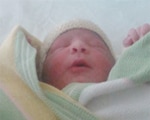Even though infants may stay awake for just a few hours a day, their brains keep working round the clock, according to a new study.

Newborn infants need to adjust their functioning and behaviour to the specific demands of the new environment after birth. This adaptation depends, at least in part, on the infant's ability to learn from experiences. To see how infants adapt to their new environments and learn new things, researchers tested 26 newborn babies. The researchers played a tune to them, and then followed it with a gentle puff of air to the babies' eyelids.
After about 20 minutes, 24 of them had learned to anticipate the puff by squeezing their eyes shut. The babies' brain waves also showed a change. This proves the infants' ability to act as data sponges - absorbing information about the world around them. Additionally, in the latter part of training, these infants exhibited a frontally maximum positive EEG slow wave possibly reflecting memory updating.
This study shows that infant's brain is constantly adjusting and adapting to the physical world around them despite appearances that they are dozing.
DoctorNDTV is the one stop site for all your health needs providing the most credible health information, health news and tips with expert advice on healthy living, diet plans, informative videos etc. You can get the most relevant and accurate info you need about health problems like diabetes, cancer, pregnancy, HIV and AIDS, weight loss and many other lifestyle diseases. We have a panel of over 350 experts who help us develop content by giving their valuable inputs and bringing to us the latest in the world of healthcare.












